|
|
|
Sort Order |
|
|
|
Items / Page
|
|
|
|
|
|
|
| Srl | Item |
| 1 |
ID:
157298
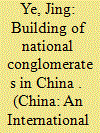

|
|
|
|
|
| Summary/Abstract |
Why do central state-owned enterprises (SOEs) in China enjoy rapid development while, overall, the state-owned economy is experiencing a contraction? The extant theories have separately argued that the support of the central government and compliance with market requirements are the driving forces behind the success of central SOEs. However, these theories have neglected the local governments’ role in the expansion of central SOEs. This article contends that variations in provincial fiscal capacity have contributed to the development of central SOEs. If a province has a weak fiscal capacity, local governments welcome central SOEs to merge with their local SOEs. In this way, the local governments can save up the fiscal grants intended for local SOEs and promote local economic development. At the same time, central SOEs gain access to the resources and expand their markets by merging with the local SOEs, thereby strengthening the central SOEs. On the contrary, if a province has a strong fiscal capacity, the local government will invest a large amount of fiscal resources to help its local SOEs survive. As a result, the expansion of central SOEs is hindered in such type of province. This article uses paired comparison of two provinces in China, Zhejiang and Liaoning, to test this hypothesis.
|
|
|
|
|
|
|
|
|
|
|
|
|
|
|
|
| 2 |
ID:
146501
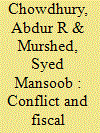

|
|
|
|
|
| Summary/Abstract |
We examine the role of war in retarding state fiscal capacity in developing countries, measured by tax revenue ratios to GDP. We build a simple theoretical model of a factionalized state, where patronage substitutes for common interest public goods, along with violent contestation over a rent or prize. Our dynamic panel empirical analysis applied to 79 developing countries, during 1980–2010, indicates that war, especially civil war, retards fiscal capacity, along with imperfect democracy, political repression, poor governance, and dependence on oil and macroeconomic mismanagement. High intensity conflict is particularly destructive of state capacity. In countries experiencing low intensity wars, other institutional factors may matter more than war. The diminution of fiscal capacity due to war appears less pronounced after the end of the cold war.
|
|
|
|
|
|
|
|
|
|
|
|
|
|
|
|
| 3 |
ID:
164520
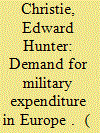

|
|
|
|
|
| Summary/Abstract |
A variant of established work on the demand for military expenditure is developed based on a practical concept of fiscal space from the perspective of short-term government choices concerning public expenditures. A new indicator, referred to as fiscal capacity, is defined and used as a candidate explanatory variable in an empirical model of European defence spending over the 2007–2016 period. Fiscal capacity is found to outperform simpler measurements of economic conditions, notably GDP growth forecasts, in explaining changes in defence spending efforts as a share of GDP. Regarding security environment variables, the results suggest that Russia has recently come to be seen as a potential military threat by European nations, leading to defence spending increases, the more so the shorter the distance to stationed or deployed Russian forces, and particularly so by those European nations that have a land border with Russia. A prospective exercise is then carried out in order to assess the capacity of EU member states that are also members of NATO to reach NATO’s 2% goal for defence spending over a mid-term horizon.
|
|
|
|
|
|
|
|
|
|
|
|
|
|
|
|
| 4 |
ID:
156989
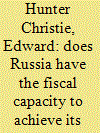

|
|
|
|
|
| Summary/Abstract |
In this article, Edward Hunter Christie sheds light on the extent to which Russia’s economic trajectory may enable or constrain its military modernisation goals. It adds to existing research by using quantitative scenarios and counterfactual analyses of the state’s fiscal conditions under different assumed levels of ambition for defence procurement spending. This approach leads to a more evidence-based assessment of the policy preferences of the Russian leadership. It also provides an objective basis for evaluating Russia’s fiscal capacity to fulfil its ambitions in a mid-term perspective.
|
|
|
|
|
|
|
|
|
|
|
|
|
|
|
|
| 5 |
ID:
185604
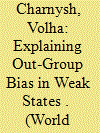

|
|
|
|
|
| Summary/Abstract |
Two dominant explanations for ethnic bias in distributional outcomes are electoral incentives and out-group prejudice. This article proposes a novel and complementary explanation for the phenomenon: variation in legibility across ethnic groups. The author argues that states will allocate fewer resources to groups from which they cannot gather accurate information or collect taxes. The argument is supported by original data on state aid from the 1891/1892 famine in the Russian Empire. Qualitative and quantitative analyses show that districts with a larger Muslim population experienced higher famine mortality and received less generous public assistance. The Muslims, historically ruled via religious intermediaries, were less legible to state officials and generated lower fiscal revenues. State officials could not count on the repayment of food loans or collect tax arrears from Muslim communes, so they were more likely to withhold aid. State relief did not vary with the presence of other minorities that were more legible and generated more revenue.
|
|
|
|
|
|
|
|
|
|
|
|
|
|
|
|
| 6 |
ID:
184059
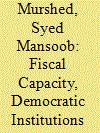

|
|
|
|
|
| Summary/Abstract |
The purpose of this paper is to gauge the various determinants of social sector spending captured by social protection and education spending in a cross section of developing countries, a subject on which there is scant empirical evidence. We hypothesize that fiscal capacity is necessary but not sufficient for resource allocation in this area, because the political will to do so must also be present. Using a panel data instrumental variable approach, we find that greater fiscal capacity robustly raises social spending in developing countries in the period 1990 to 2010. It is also strongly evident that rising democratisation enhances social sector spending; the presence of greater democracy and higher fiscal capacity could reinforce this effect. Our work also innovatively incorporates inequality into the analysis, finding that social expenditure is greater in more egalitarian societies. Military expenditure also appears to crowd out social protection expenditure, but not robustly.
|
|
|
|
|
|
|
|
|
|
|
|
|
|
|
|
| 7 |
ID:
191906
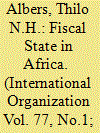

|
|
|
|
|
| Summary/Abstract |
What is the level of state capacity in developing countries today, and what have been its drivers over the past century? We construct a comprehensive new data set of tax and revenue collection for forty-six African polities from 1900 to 2015. Our data show that polities in Africa have been characterized by strong growth in fiscal capacity on average, but that substantial heterogeneity exists. The empirical analysis reveals that canonical state-building factors such as democratic institutions and interstate warfare have limited power to explain these divergent growth paths. On the other hand, accounting for the relationship between African polities and the international environment—through the availability of external finance and the legacy of colonialism—is key to understanding their differing investments in fiscal capacity. These insights add important nuances to established theories of state building. Not only can the availability of external finance deter investment in fiscal capacity, but it also moderates the efficacy of canonical state-building factors.
|
|
|
|
|
|
|
|
|
|
|
|
|
|
|
|
| 8 |
ID:
130879
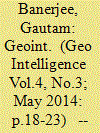

|
|
|
|
|
| Publication |
2014.
|
| Summary/Abstract |
Combat, by its very definition, is an event extra-ordinarily excruciating. It is an ultimate condition that is distinguishable by its phenomenal characteristics which demand, among other undertakings, absolute perfection in marshalling the diverse elements of combat that constitute a military force, for example, troops, firepower, mobility and intelligence. Thus down the ages, 'Great Captains' of war have articulated their strategic intellect to secure victory, irrespective of the bulk of forces, by the best orchestration of the resources under their command. In modern times, developments in 'Information Warfare' have raised the bar of such Terrain intelligence has always been important for winning a battle. In this aricle, the writer advocates establishing a repository of battle-space geographic information called Military Geospatial Intelligence System (MGIS) orchestration to such a high level that it becomes possible to exploit to the hilt the individual capabilities of each element of the military machine. More importantly, it is possible now to seamlessly integrate all such diverse force-elements into one whole system of war-fighting. Military intelligence - terrestrial, strategic and tactical - has always been the most decisive factor in application of combat power as well as an enabling tool for the aforementioned 'best' orchestration of military resources. Within its overall ambit, terrain intelligence - geospatial intelligence in the wider sense as we understand today - has been the pivot of strategic, operational and tactical decision making. In the contemporary period of technological explosion, that pivot has assumed unlimited scope for articulation. At the crosshairs of ever-adversarial forces across terrains of unique descriptions, institution of an efficient mechanism for harnessing the properties of geospatial intelligence - MGIS - must, therefore, be a top priority for India. However, to be really effective, that endeavour has to be tailored to Indian conditions and backed up with indigenous competences; the scope and coverage of GIS as propounded by the lead militaries of the world, USA, China, NATO and Russia, is neither accessible nor sustainable and may not even be necessary in the context of India's technical-industrial-fiscal capacity, and inter alia, her military objectives.
|
|
|
|
|
|
|
|
|
|
|
|
|
|
|
|
| 9 |
ID:
191915


|
|
|
|
|
| Summary/Abstract |
This article describes and explains a previously overlooked empirical pattern in state revenue collection. As late as 1913, central governments in the West collected similar levels of per capita revenue as the rest of the world, despite ruling richer societies and experiencing a long history of fiscal innovation. Western revenue levels permanently diverged only in the following half-century. We identify the twentieth-century great revenue divergence by constructing a new panel data set of central government revenue with broad spatial and temporal coverage. To explain the pattern, we argue that sustainably high levels of revenue extraction require societal demand for an activist state, and a supply of effective bureaucratic institutions. Neither factor in isolation is sufficient. We formalize this insight in a game-theoretic model. The government can choose among low-effort, legibility-intensive, and crony-favoring strategies for raising revenues. Empirically, our theory accounts for low revenue intake in periods of low demand (the nineteenth-century West) or low bureaucratic capacity (twentieth-century former colonies), and for eventual revenue spikes in the West.
|
|
|
|
|
|
|
|
|
|
|
|
|
|
|
|
| 10 |
ID:
160859
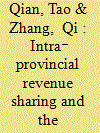

|
|
|
|
|
| Summary/Abstract |
This study investigates whether the tax‐sharing system has deteriorated the fiscal capacity of subnational governments by analyzing how fiscal revenues are divided between provincial and sub‐provincial governments. Our study of county‐level fiscal data from Zhejiang Province in China during 1994–2007 shows that intra‐provincial revenue‐sharing rules favor county governments in two ways: (i) they improve county governments ‘fiscal autonomy in terms of using their own revenues; and (ii) they enhance county governments ‘fiscal capacity through province‐to‐county general transfers. In addition, we find that intra‐provincial fiscal revenue‐sharing rules and transfers reduce fiscal disparity between counties.
|
|
|
|
|
|
|
|
|
|
|
|
|
|
|
|
| 11 |
ID:
169318
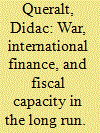

|
|
|
|
|
| Summary/Abstract |
In this article I revisit the relationship between war and state making in modern times by focusing on two prominent types of war finance: taxes and foreign loans. Financing war with tax money enhances the capacity to assess wealth and monitor compliance, namely fiscal capacity. Tax-financed war facilitates the adoption of power-sharing institutions, which transform taxation into a non-zero-sum game, carrying on the effect of war in the long run. Financing war with external capital does not contribute to long-term fiscal capacity if borrowers interrupt debt service and, as part of the default settlement, war debt is condoned or exchanged for nontax revenue. The empirical evidence draws from war around the world as early as 1816. Results suggest that globalization of capital markets in the nineteenth century undermined the association between war, state making, and political reform.
|
|
|
|
|
|
|
|
|
|
|
|
|
|
|
|
|
|
|
|
|